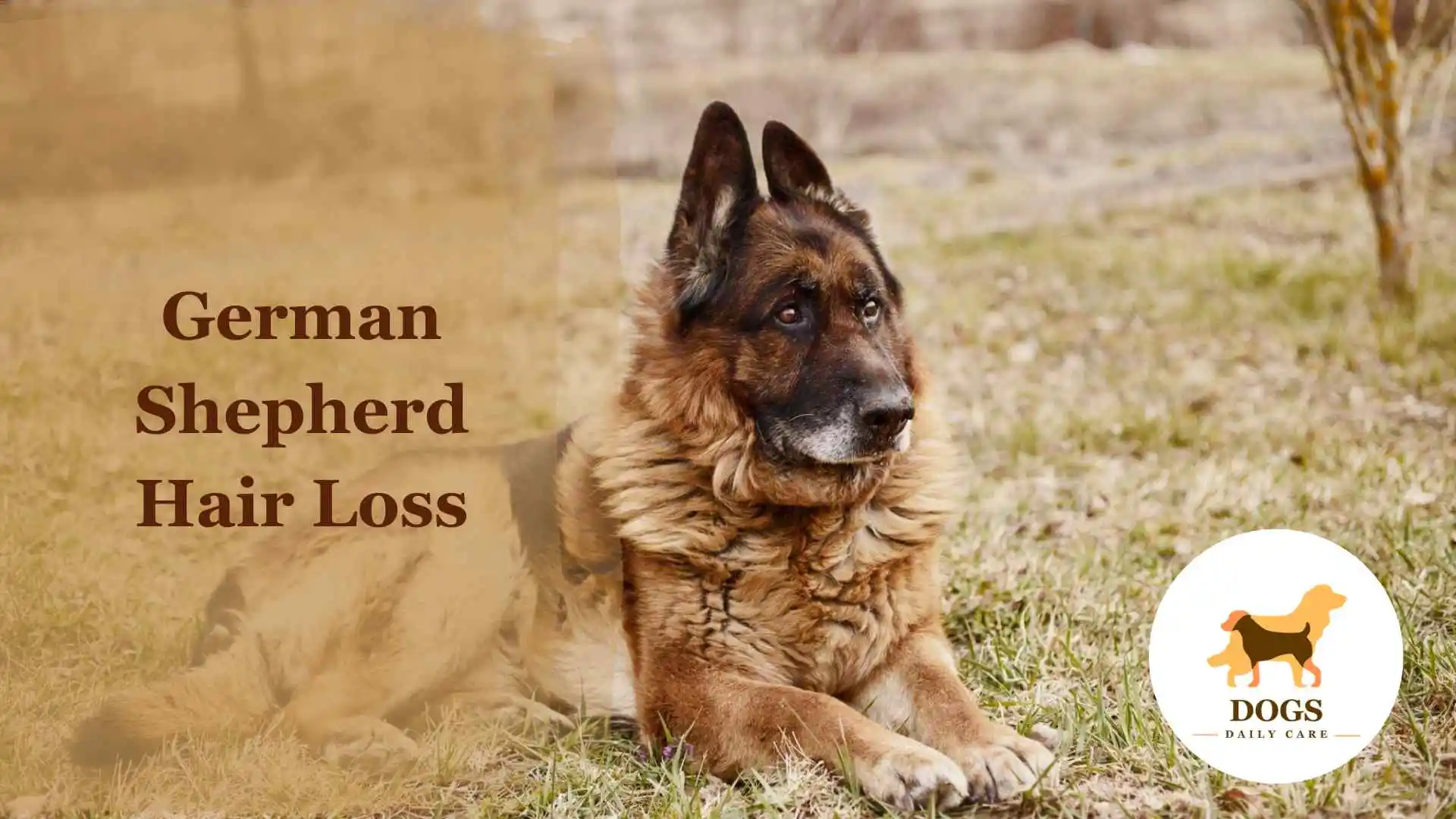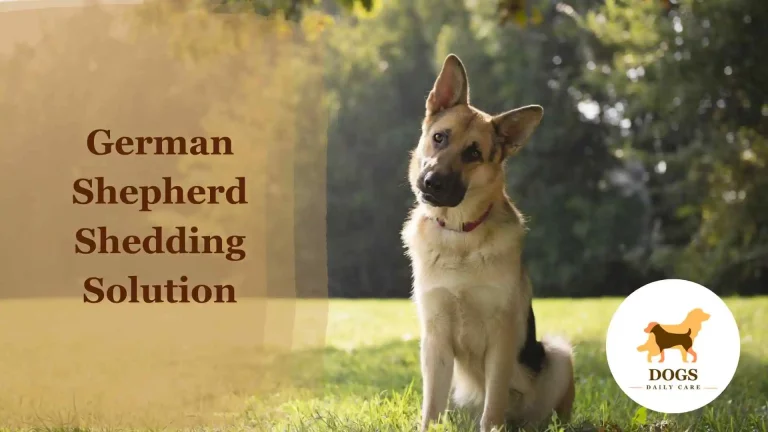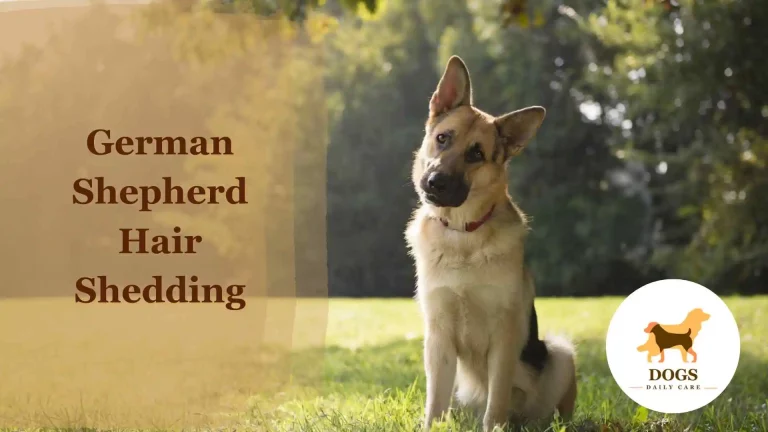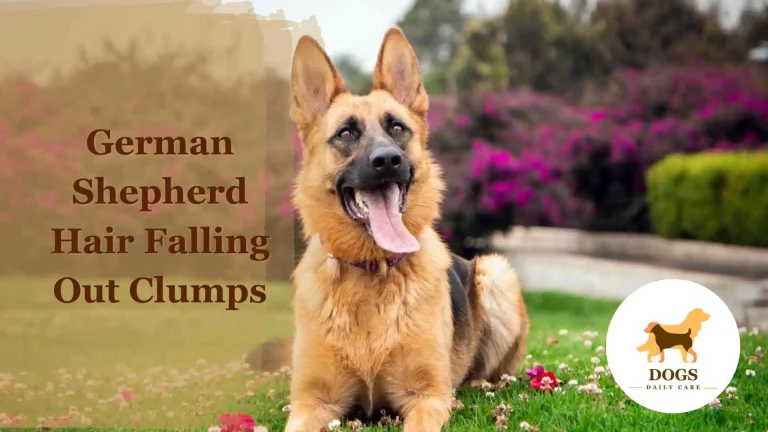German Shepherd Hair Loss – All You Need To Know
Is your beloved German Shepherd losing hair, leaving bare patches or exhibiting a less-than-lustrous coat? It’s a common concern among German Shepherd owners and something that can trigger a flurry of worry. German Shepherds are known for their thick, luxurious coats, and when that starts to change, it’s only natural to seek solutions. Hair loss in dogs, especially a breed as majestic as the German Shepherd, can sometimes be a sign of underlying health issues, while at other times, it may just be a seasonal shed.
In the sections that follow, we will delve deep into the common causes of hair loss, how to go about diagnosing this issue, the various treatment routes one could consider, and preventive measures to ensure your German Shepherd maintains a healthy, vibrant coat.
Common Causes of Hair Loss in German Shepherds
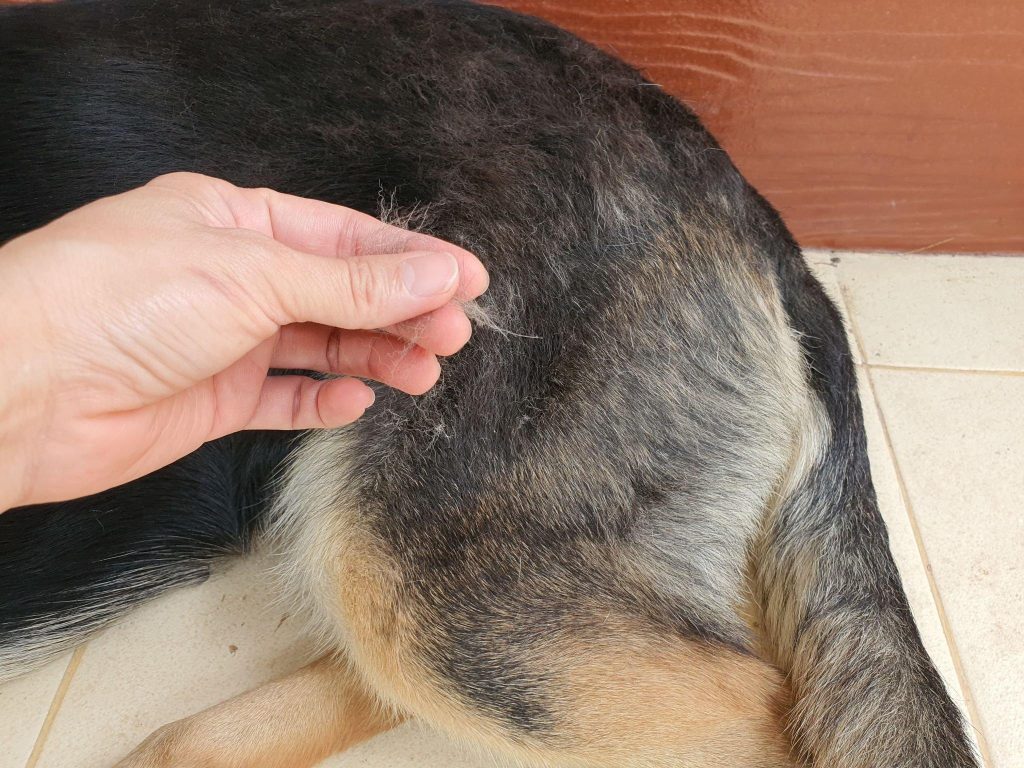
Unraveling the causes behind your German Shepherd’s hair loss can feel like a daunting task given the myriad of possibilities. Below are some common culprits accompanied by a brief explanation to provide you with a clearer understanding:
Genetic Factors
German Shepherds may inherit certain skin conditions from their lineage which could result in hair loss. Conditions like alopecia are often passed down genetically and may manifest at a young age.
Allergies (Food and Environmental)
Allergies are a common cause of hair loss in German Shepherds. They may react to certain food ingredients, pollens, molds, or household cleaning products. Identifying and eliminating allergens can significantly improve your dog’s skin and coat condition.
Parasitic Infections (Fleas, Mites, etc.)
Parasites like fleas and mites can wreak havoc on your German Shepherd’s coat, leading to intense itching, irritation, and subsequent hair loss. Regularly inspecting your dog’s coat and taking preventive measures can keep pesky parasites at bay.
Dermatitis
Dermatitis or inflammation of the skin can result from various irritants or infections, leading to hair loss. If your German Shepherd is constantly scratching or licking certain areas, dermatitis could be the culprit.
Hormonal Imbalances
Hormonal issues like hypothyroidism or Cushing’s disease can lead to hair loss. If you suspect a hormonal imbalance, a vet can conduct tests to confirm and suggest a suitable treatment plan.
Stress
Just like humans, dogs can experience stress which may manifest through hair loss. Changes in the environment, a new family member, or other pets can sometimes stress your German Shepherd, leading to hair loss.
Each of these common causes presents a pathway to uncovering the root of your German Shepherd’s hair loss issue. It’s crucial to observe your dog’s behavior and physical condition, and when in doubt, always consult with a veterinary professional. As we navigate through the following sections, we will further explore the steps to diagnosing and treating hair loss in German Shepherds to ensure your loyal companion remains comfortable and flaunts a healthy, shiny coat.
Diagnosing Hair Loss in German Shepherds
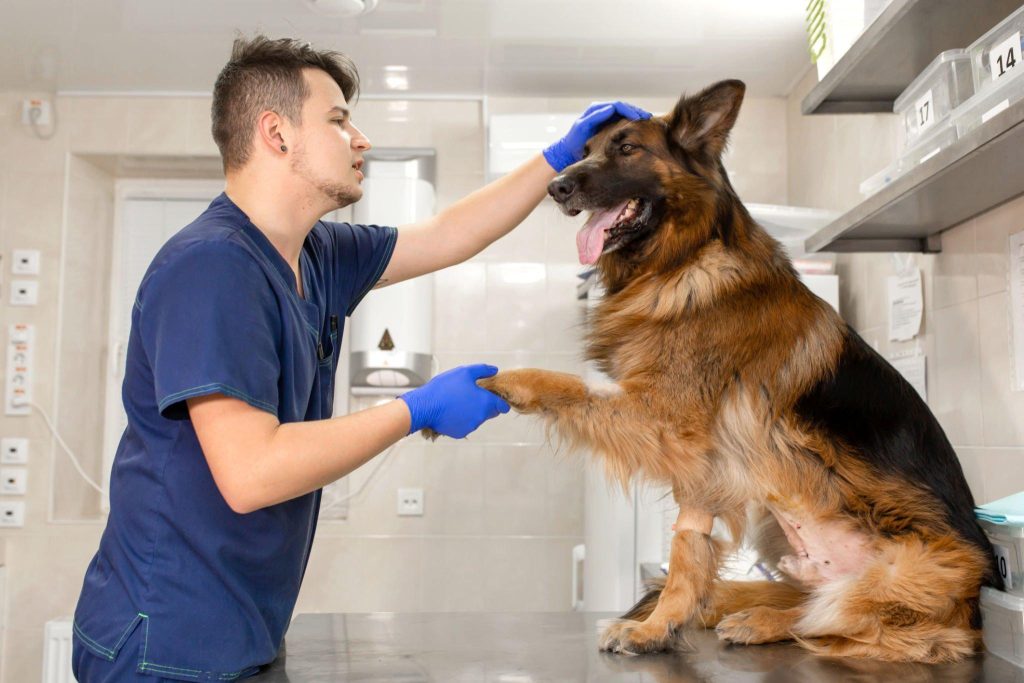
Diagnosing the root cause of hair loss in your German Shepherd can be a meticulous process, but it’s a crucial step toward restoring your furry companion’s vibrant coat. Here are some common diagnostic methods and what you can expect during each:
Veterinary Examinations
A thorough examination by a veterinarian is the first and foremost step in diagnosing hair loss in German Shepherds. Your vet will likely conduct a full physical examination, review your dog’s medical history, and inquire about any recent changes in diet, environment, or behavior.
Allergy Testing
If allergies are suspected, your vet may recommend allergy testing to identify specific triggers. This can be done through blood tests or skin tests, helping to pinpoint whether food or environmental allergens are the cause of your dog’s hair loss.
Blood Tests
Blood tests can provide a wealth of information about your German Shepherd’s overall health and hormonal balance. They can reveal underlying conditions like hypothyroidism or other systemic issues that might be contributing to hair loss.
Skin Scrapings and Biopsies
Skin scrapings and biopsies are common diagnostic procedures used to identify skin infections, parasites, or dermatological conditions. These tests can provide valuable insights into the health of your dog’s skin and hair follicles.
Each diagnostic step unveils more about the health status of your German Shepherd, inching closer to the root cause of the hair loss issue. While it might seem overwhelming, remember, accurate diagnosis is the cornerstone for effective treatment. In the upcoming sections, we will explore the variety of treatment options available to tackle hair loss in German Shepherds, ensuring you’re well-equipped to provide the best care for your four-legged friend. Through prompt and precise diagnosis, you pave the way towards alleviating your German Shepherd’s discomfort and promoting a luscious, healthy coat.
Treatment Options for Hair Loss in German Shepherds
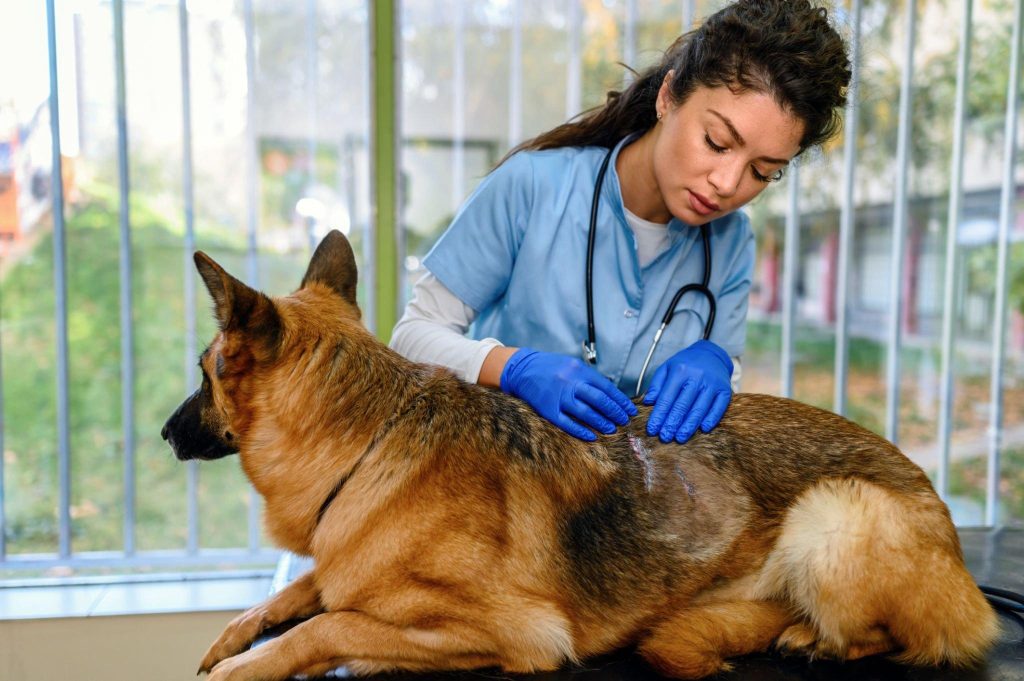
Addressing the hair loss issue in your German Shepherd promptly can prevent further complications and enhance the quality of life for your loyal companion. Here are several treatment avenues you might consider based on the diagnosis:
Diet Modifications
Nutritional imbalances can sometimes lead to hair loss. Ensuring your German Shepherd is on a balanced, nutritious diet rich in omega-3 and omega-6 fatty acids can promote healthier skin and a shinier coat. Consulting with your vet for a personalized diet plan can be a game-changer.
Medications and Topical Treatments
If your German Shepherd’s hair loss is due to infections, allergies, or other medical conditions, your vet may prescribe medications or topical treatments. These can include antifungal medications, antibiotics, anti-inflammatory drugs, or medicated shampoos and ointments to treat the affected areas.
Regular Grooming
Regular grooming is essential to maintain a healthy coat and skin. Brushing helps to remove loose hair and dander, stimulates the skin, and distributes natural oils along the length of the hair. It’s also a great way to inspect your dog’s skin for signs of irritations, infections, or parasites.
Stress Reduction Techniques
If stress is identified as a contributing factor to your German Shepherd’s hair loss, incorporating stress reduction techniques such as regular exercise, play, and providing a secure and comfortable environment can make a significant difference.
Hormonal Therapy
For hormonal imbalances like hypothyroidism, hormonal therapy may be required. Your vet will guide you through the necessary treatment to manage or correct the hormonal imbalance, aiding in hair regrowth and overall well-being.
Natural Remedies
Some natural remedies may help in alleviating skin conditions and promoting hair growth. Always consult with your vet before trying any natural remedies to ensure they are safe and suitable for your German Shepherd.
The course of treatment for hair loss in German Shepherds greatly depends on the underlying cause. It’s imperative to work closely with your vet to devise a tailored treatment plan that addresses the specific needs of your dog. With a combination of medical treatment, good nutrition, regular grooming, and a loving environment, you can help your German Shepherd overcome hair loss and thrive with a glossy, full coat once more. In the next section, we will look into preventative measures to keep such issues at bay in the future, further contributing to the well-being and happiness of your furry family member.
Prevention of Hair Loss in German Shepherds
Preventing hair loss in German Shepherds primarily revolves around maintaining a healthy lifestyle and regular check-ups. Here are some proactive steps you can take to keep your furry friend’s coat in tip-top condition:
Regular Check-ups with the Vet
Routine veterinary check-ups are crucial for early detection and prevention of issues that could lead to hair loss. Your vet can provide personalized advice based on your German Shepherd’s health status and lifestyle.
A Balanced Diet
A nutritious, well-balanced diet is the foundation of a healthy coat. Ensure your German Shepherd receives a diet rich in essential fatty acids, vitamins, and minerals which promote skin health and hair growth. Consult your vet for dietary recommendations and consider adding vet-approved supplements if necessary.
Keeping a Clean and Stress-free Environment
A clean environment minimizes the risk of parasitic infestations and infections that can cause hair loss. Additionally, a stable, stress-free environment contributes to the overall well-being of your German Shepherd, reducing anxiety-induced hair loss.
Regular Grooming
Regular grooming not only keeps your German Shepherd’s coat looking pristine but also allows you to monitor the skin for signs of problems such as redness, scaling, or parasites. Establishing a regular grooming routine helps in early detection of potential issues.
Parasite Control
Regularly administering vet-recommended flea and tick preventatives is an excellent way to keep parasites at bay, thus preventing associated hair loss.
Exercise and Mental Stimulation
Adequate exercise and mental stimulation are vital for reducing stress and promoting a healthy, shiny coat. Ensure your German Shepherd gets plenty of physical activity and mental engagement to keep them happy and healthy.
Prevention is always better than cure. By adopting a proactive approach towards your German Shepherd’s health and grooming, you can significantly reduce the likelihood of hair loss issues. Through a blend of regular veterinary care, a balanced diet, grooming, and a nurturing environment, you can help ensure your German Shepherd flaunts a beautiful, healthy coat throughout their life. Stay tuned to the next section, where we will discuss when it’s time to seek professional help, ensuring you’re fully equipped to act promptly when your German Shepherd needs care the most.
When to Seek Professional Help for Your German Shepherd’s Hair Loss
Prompt action is essential when it comes to addressing hair loss in your German Shepherd. Understanding when it’s time to seek professional help can make a significant difference in the effectiveness of the treatment and the overall well-being of your beloved pet. Here are some scenarios where professional intervention is warranted:
Excessive Shedding or Bald Spots
If your German Shepherd is shedding excessively or developing bald spots, it’s time to consult with a vet. These could be signs of underlying health issues that require professional attention.
Skin Redness, Irritation, or Infections
Skin redness, irritation, or signs of infection such as pus or foul odor are indicators of serious skin conditions. Prompt veterinary care is essential to prevent further complications.
Persistent Scratching or Biting
If your dog is persistently scratching, biting, or licking specific areas, it’s a sign of discomfort that could be related to allergies, parasites, or dermatological conditions. A vet can provide a precise diagnosis and treatment plan.
Changes in Behavior or Appetite
Changes in behavior, appetite, or energy levels alongside hair loss could signify systemic health issues. A thorough veterinary examination is crucial to identify and address the root cause.
No Improvement Despite Home Care
If you’ve attempted home care solutions and haven’t seen any improvement, or if the condition worsens, it’s a clear signal to seek professional help. Your vet can provide a more accurate diagnosis and a structured treatment plan.
Regular Follow-up Check-ups
Regular follow-up appointments with your vet will ensure that the treatment plan is working effectively and adjust the course of action if necessary. It also helps in monitoring the recovery progress of your German Shepherd’s hair condition.
Seeking professional help at the right time is imperative to ensure the optimal health and comfort of your German Shepherd. A qualified vet can provide valuable insights, accurate diagnoses, and effective treatment plans to tackle hair loss issues. As we conclude, remember that a proactive approach, coupled with a nurturing and attentive care routine, can significantly enhance the quality of life for your German Shepherd, making them a happier and healthier companion.
Frequently Asked Questions (FAQs) on German Shepherd Hair Loss
Why is my German Shepherd losing hair excessively?
Excessive hair loss in German Shepherds can stem from a variety of factors such as allergies, parasites, hormonal imbalances, dietary deficiencies, or skin infections. It’s vital to consult with a vet to ascertain the underlying cause and receive a personalized treatment plan.
Can dietary changes help in reducing hair loss?
Absolutely! A well-balanced diet rich in essential nutrients like omega-3 and omega-6 fatty acids, vitamins, and minerals can promote a healthy coat and skin. It’s advisable to consult with your vet to tailor a dietary plan that meets the unique needs of your German Shepherd.
How often should I groom my German Shepherd to prevent hair loss?
Regular grooming, ideally once a week, can significantly help in maintaining a healthy coat, spotting potential issues early, and reducing hair loss. Grooming frequency may vary based on your dog’s specific needs, so it’s good to seek advice from your vet or a professional groomer.
Are there any natural remedies for hair loss in German Shepherds?
While there may be natural remedies touted for treating hair loss, it’s crucial to proceed with caution and always consult with your vet before trying any home remedies. Each dog’s situation is unique, and what works for one may not work for another, making professional guidance essential.
When should I be concerned about my German Shepherd’s hair loss?
If the hair loss is excessive, accompanied by skin irritation, redness, or other behavioral changes, it’s time to seek professional help. Early intervention can prevent further complications and improve the chances of successful treatment, ensuring your German Shepherd remains healthy and comfortable.
Conclusion
Tackling hair loss in your German Shepherd encompasses a blend of timely veterinary care, a balanced diet, regular grooming, and a nurturing environment. Understanding the underlying causes, seeking professional diagnosis, and adhering to a personalized treatment plan are crucial steps towards ensuring the holistic well-being of your furry companion. The journey may require patience and diligence, but the reward is a vibrant, healthy coat that not only enhances your German Shepherd’s appearance but reflects their overall health and vitality.
In the digital age, a wealth of information is available at our fingertips. However, it’s essential to rely on professional veterinary advice when it comes to managing and treating hair loss in your German Shepherd. Every dog is unique, and what works for one may not work for another. Through a blend of awareness, proper care, and medical guidance, you can significantly contribute to improving your German Shepherd’s quality of life, fostering a happy, healthy, and fulfilling companionship.

